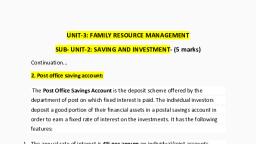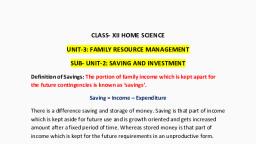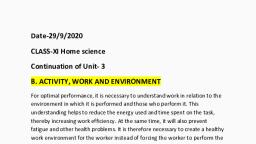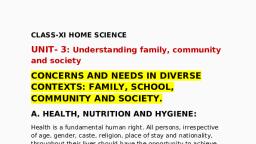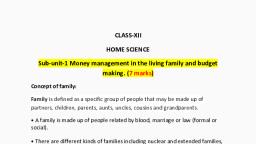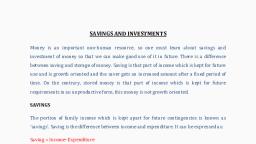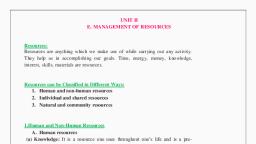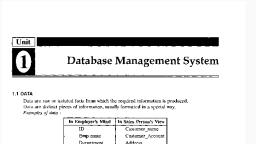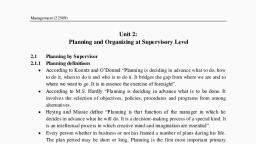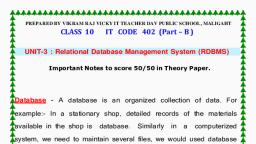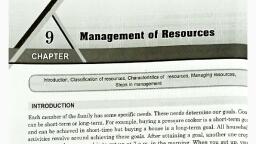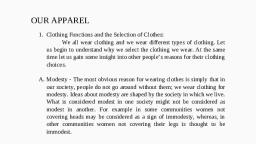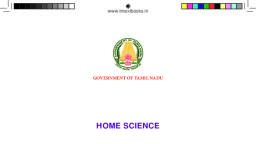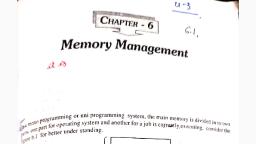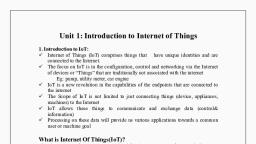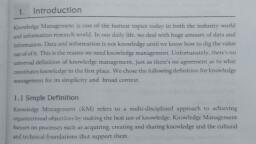Page 1 :
Dated: 7/10/2020, Class- XI Home science, Unit- 3 Concerns and needs in diverse contexts:, , C. RESOURCE AVAILABILITY AND MANAGEMENT, TIME MANAGEMENT: Time management is the process of planning and, exercising conscious control of time spent on specific activities, especially to, increase effectiveness, efficiency, and productivity., The principle of time management is to concentrate on results, not on being, busy. All time management begins with planning. A time plan is necessary. A, time plan can be defined as an advance schedule of activities to be, performed in a given time period., Steps in time and activity plan:, Start the work as soon as possible. Do not waste time in avoiding or, delaying the task., Get into a routine every day., Prioritise the task. Do not undertake too many activities at a particular, time., Do not commit our self to unimportant and low priority task., Divide the big tasks into a series of small manageable activities., Do not waste energy or time on task which do not need much attention., Arrange ‘start’ and ‘stop’ times to schedule activities., Make a schedule of our activities and tasks.
Page 2 :
Types of activities, , Compulsory, , Optional, , Daily, , Weekly, , Monthly, Yearly, , Tips for effective time management:, i., ii., iii., , Create a simple ‘to do’ list, Daily/ weekly planner., Long term planner., , Tools in time management:, i., ii., , Peak load period: It is the maximum load of work during a specified, period of time., Work curve: A device to trace the work against time.
Page 3 :
iii., iv., , Rest period/ break period: are defined as unproductive interruptions of, working time., Work simplification: can be defined as the conscious seeking of the, simplest, easiest and quickest method of doing work. It aims at, accomplishing more work with a given amount of time and energy, or at, reducing the amount of either or both to accomplish a given amount of, work. In order to bring change in work procedure as well as to simplify it,, three levels of changes are important. They are Change in hand and body motions, Change in work, storage space and equipment., Change in the end product., , SPACE MANAGEMENT:, Space management involves planning of space, organising it as per the plan,, implementing the plan in terms of its utilisation and evaluating it in terms of, achieving functionally and aesthetic appeal., , Principles of space planning:, Space must be planned for its optimal utilisation. Following are the principles1) Aspect- It indicates the arrangement of doors and windows in the, external walls of a building which allows the occupants to enjoy the, nature in the form of sunshine, breeze, scenery,etc., 2) Prospect- It is the impression or impact that a house is likely to make on, a person who looks at it from outside. Therefore it includes the, attainment of pleasing appearance using natural beauty, positioning of, doors and windows and covering up of undesirable views., 3) Privacy- It is one of the most important principles. It requires, consideration in two ways: A) Internal privacy: Privacy of one room from, another is referred to as internal privacy. B) External privacy: This means, privacy of all parts of a house from the neighbouring buildings or houses,, public streets and by-ways., 4) Grouping- It implies the outlook of rooms with respect to their relative, position with each other.
Page 4 :
5) Roominess- It is the spacious effect a room gives to those who live in it., The available space should be made use of fully., 6) Furniture requirements- The room must be planned with due thought to, the furniture to be placed there., 7) Sanitation- It consists of providing ample light, ventilation, facilities for, cleaning and sanitary conveniences., 8) Circulation- Air circulation from room to room should be possible. Good, circulation includes an independent entry to each living space through a, common space., 9) Practical considerations- While planning spaces one may consider, practical points such as strength and stability of the structure,, convenience and comfort for the family, simplicity, beauty and provision, for expansion in future., 10), Elegance- It is the effect produced by the general layout of the, plan., The above mentioned principles when considered, aid in space planning and, management.

